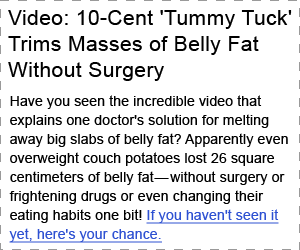|
The most recent example comes in the form of a free-speech limiting effort by the Food and Drug Administration, which has used a truth-in-labeling regulation to create a "violation" out of whole cloth in what appears to be nothing more than an arbitrary, capricious and punitive action. The FDA has recently issued warning letters to a pair of supplement companies whose "crime" was nothing more than having customer-related interactions via the Internet. From the Alliance for Natural Health: Here is what triggered one of them: supplement company AMARC Enterprises "liked" a Facebook customer testimonial about how their product helped "keep cancer at bay." FDA says this means AMARC made a disease claim. Note that the customer did not even say that the product cured cancer, just that it helped keep the customer free of cancer. As the alliance noted in a blog about the FDA's actions, it now appears as though the agency believes companies are now responsible for customer comments on social media websites, which are "an increasingly important form of communication and interaction between companies and the public." The second recent supplement company reprimand letter from the FDA was directed at MDR Fitness Corp., and was triggered by an equally imagined violation: When someone types disease terms into a search box on the company's website, the FDA says, that constitutes an "implied" claim of curing that disease. A dubious claim of regulatory righteousness "This goes too far. It means that even a sentence such as, 'Living in a healthy way can help avoid cancer or heart attacks,' will be disallowed," the ANH said. "Certain words will be absolutely forbidden. This is a very slippery slope. Once this line is crossed, how far will the FDA go?" The agency is claiming it has a right to act under the Food, Drug and Cosmetic Act, because a drug is defined as a product "intended for use in the diagnosis, cure, mitigation, treatment, or prevention of disease in man or other animals." The FDA regulations health claims made on product labels, and that includes supplement labels as well, so under this "intended use" doctrine, FDA bureaucrats are concluding that a product is a "drug" based only on the promotional claims made by a company or, as that pertains to last year's federal appeals court case, U.S. v. Caronia, statements made by an advertiser or promoter. "For example, garlic becomes an illegal drug if an advertiser claims that the product will cure food poisoning, even though this is verifiably true. Similarly, manuka honey becomes an illegal drug if a seller mentions that it will stop skin infections (also verifiably true, as even the New York Times has reported). There are many, many such examples," says the ANH. The same "intended use" doctrine can also be manipulated to apply to many non-traditional products, turning them into "drugs" or "medical devices." For instance, in 2012 the FDA hinted it would eventually regulate medical mobile apps for smart phones and tablets because such apps could essentially transform them into a medical device. Do you see how this crazy "logic" appears logical to the statist and bureaucrat? (A side note regarding medical apps and the FDA's description of them as "medical devices" - many in Congress are now concerned that if smart phones and tablets with medical apps are deemed as medical devices, they could be liable for taxation under the medical devices tax contained in Obamacare. See how the craziness is unending?) The federal bureaucratic lunacy continues The FDA's new warnings appear to be in conflict with the judge's decision in the Caronia case. ANH said that decision "mostly underscored protections of free commercial speech. FDA is using a very broad interpretation of what constitutes a disease claim, explicit or especially implied." As Facebook users know, to simply "like" something is nothing more than a passive acknowledgement of someone's comment; to glean otherwise, especially in the context of the FDA's warning to the supplement makers, goes beyond the ludicrous. The FDA "may; however, be a little worried," the ANH said. "The agency buried the above warnings amid a list of other alleged infractions. The agency seems to be trying to expand its Internet regulatory reach in a piecemeal under-the-radar fashion. We need to let them know we are noticing. We also need to pass the Free Speech About Science Act." Sources: http://www.anh-usa.org http://www.raps.org http://www.fda.gov |




No comments:
Post a Comment